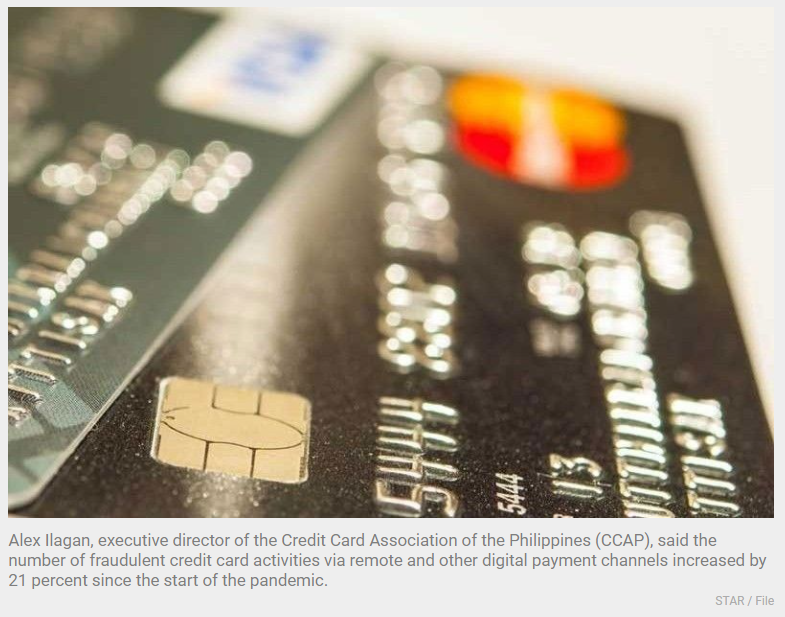Philippines: Credit card firms seek tighter measures vs SIM swap fraud
MANILA, Philippines — Credit card issuers are urging the National Telecommunications Commission (NTC) as well as telecom providers to institute measures to stem the rise in fraudulent credit card transactions due to SIM card swap.
Alex Ilagan, executive director of the Credit Card Association of the Philippines (CCAP), said the number of fraudulent credit card activities via remote and other digital payment channels increased by 21 percent since the start of the pandemic.
“The industry has been experiencing high volumes of fraud cases causing financial detriment. These perpetrators have carried out fraud by using the various digital payment platforms to commit crime,” Ilagan said.
He said the highest number of incidents of credit card fraud involve the “virtual account takeover” scam, which involves taking over and gaining access to one-time passwords of unknowing customers, enabling fraudsters to perform OTP-validated online transactions.
“The fraudsters’ techniques and equipment are continuously being enhanced and innovated on a daily basis. Many of these techniques and equipment are dependent on the fact that they need to communicate with the consumer with virtual anonymity,” he said.
Ilagan stressed the need to vigorously fight the fraudsters as the war against financial crime is a shared responsibility among all concerned industries and the government.
For one, the association of 18 credit card issuers urged the NTC to establish a recourse mechanism for Filipino consumers to actively report telephone numbers being used for malicious intents.
“We believe that this will effectively facilitate a convenient, standard and reliable reporting platform with a consistent, trustworthy process where consumers report telephone numbers being used by fraudsters or by some random persons offering to click links or awards/prizes or even offer jobs, without these being triggered by consumers. This standardized reporting mechanism is absent in today’s environment which leads hesitancy from the victims to properly report incidents to their respective banks or telecommunication providers,” CCAP said in its letter to the NTC.
In separate letters to Smart Communications and Globe Telecom, CCAP also encouraged telcos to tighten their existing Know Your Customer (KYC) process when onboarding new prepaid and postpaid customers, particularly when it comes to the ID verification process when customers request to change mobile numbers when declaring a lost or stolen mobile unit.
“We respectfully request that this be addressed urgently. Perpetration of a successful unauthorized SIM swap will affect both the telcos’ and the banks’ customers, resulting in financial losses, loss of public trust and confidence, and close scrutiny from the regulators,” CCAP said.
The group also urged lawmakers to enact and implement House Bill 5793 or the Subscriber Identity Module (SIM) Card Registration Act as well as Senate Bill 2395 or the SIM Card Registration Act.
The Senate and the House of Representatives have approved the bills that seek to establish a system of sale and registration of SIM card and help law enforcers track down those who use mobile phones to engage in criminal activities.
“To date, there are no existing laws which protect the consumers from this mode of attack from the fraudsters. We believe that the passage and implementation of this law will greatly deter the activities of the fraudsters as they will now have accountability from the use of the then registered SIM cards,” CCAP said.
Under the Digital Payments Transformation Roadmap, the Bangko Sentral ng Pilipinas (BSP) aims to convert 50 percent of total retail transactions to electronic channels by 2023 as part of the commitment made by BSP Governor Benjamin Diokno to transform the Philippines into a cash-light from a cash-heavy economy.
With the pandemic serving as catalyst, Diokno said the share of digital payments to total retail transactions in terms of volume climbed to 30 percent in 2021 from only 20.1 percent in 2020.
Source: https://www.philstar.com/business/2022/01/07/2152221/credit-card-firms-seek-tighter-measures-vs-sim-swap-fraud


 Thailand
Thailand




